International North-South Transport Corridor

North-South Transport Corridor India Russia Armenia Kazakhstan
- Introduction to the International North-South Transport Corridor (India-Russia)
- Member countries of the corridor: Iran, Russia, India, Azerbaijan, Armenia, Kazakhstan, Kyrgyzstan, Tajikistan, Ukraine, Belarus, Oman and Syria
- Main features of the International Transport Corridor
North-South
- Integration of the International North-South Transport Corridor with the:
- Kazakhstan-Turkmenistan-Iran Railway (Transnational North-South Corridor)
- South Armenia-Iran railway
- Trans-Siberian Railway (Russia, North Korea)
- The importance of the Port of Astara (Iran)
- The corridor and the New Silk Road

The Subject «International North-South Transport Corridor (India-Russia)» belongs to the following Online Programs taught by EENI Global Business School:
Transportation Courses: Road, Railway, Multimodal.
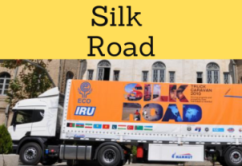
Diploma: International Transport.
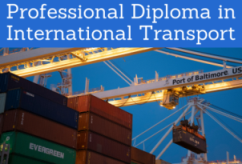
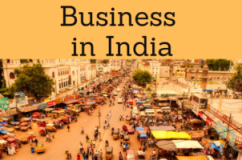
Masters: International Transport, International Business.
Doctorate: Global Logistics, World Trade.
Languages:  .
Summary in
.
Summary in  Corredor Internacional de Transporte Norte-Sur
Corredor Internacional de Transporte Norte-Sur
 Corridor international de Transport Nord-Sud
Corridor international de Transport Nord-Sud  Corredor Internacional de Transporte Norte-Sul.
Corredor Internacional de Transporte Norte-Sul.
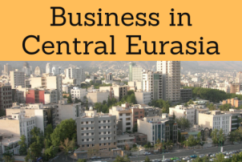
Sample - International North-South Transport Corridor

International North-South Transport Corridor.
The International North-South Transport Corridor (INSTC) is a multimodal transport network (maritime, rail, road) formed by Iran, Russia, India, Azerbaijan, Armenia, Kazakhstan, Kyrgyzstan, Tajikistan, Ukraine, Belarus, Oman and Syria.
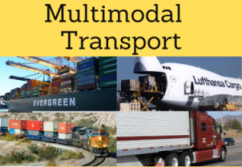
- Bulgaria is an observer country
- Turkey, Turkmenistan and Uzbekistan are not members, but are located in the corridor's area of influence
- Pakistan is considering joining the International North-South Transport Corridor (despite the tense relations with India)
The International North-South Transport Corridor connects with the New Silk Road.
- Main cities: Mumbai, Moscow, Tehran, Baku, Bandar Abbas, Astrakhan, Bandar Anzali
- According to the Association of the Federation of Freight Forwarders of India, the cost of sending goods by the route of the North-South International Transport Corridor is 30% cheaper and 40% shorter than the traditional route (by sea, through the Canal Suez, 45-60 days)
- Estimated time Russia-India when the corridor is fully operational: 16-21
- India will avoid passing through Pakistan to access the markets of Central Eurasia
- For India it is a highly strategic project to offset the growing influence of China in the region (New Silk Road)
The corridor project was created in 2000 by Iran, Russia and India with the aim of promoting cooperation between logistics networks in India, Russia, Iran, Europe and Central Asia.
The International North-South Transport Corridor was subsequently
expanded to include Azerbaijan, Armenia, Kazakhstan, Kyrgyzstan, Tajikistan,
Ukraine, Belarus, Oman and Syria.
The International North-South Transport Corridor considerably improves access to the landlocked Central Asian republics
International North-South Transportation Corridor
Route
The corridor starts in Mumbai (India), connecting by sea with the
port city of Bandar Abbas (southern coast of Iran, Persian Gulf,
Hormuz Strait, 85% of the Iranian maritime trade). Then it connects by road
with the port of Bandar-e-Anzali (Iran) located in the Caspian Sea.
From Bandar-e-Anzali by ship across the Caspian Sea, Astrakhan (Russia)
is reached on the banks of the Volga River. From Astrakhan it links with Moscow, Saint Petersburg and other Russian regions and Europe through the Russian railway network.
Railway Kazakhstan-Turkmenistan-Iran (North-South Transnational Corridor)
- Distance: 677 km
- It connects Kazakhstan (Uzen Uzen, 137 km) and Turkmenistan (Bereket - Etrek, 470 km) with Iran (Gorgan, Golestan, 70 km) and to the Persian Gulf by another railway
- Bereket (Turkmenistan) is an important railway node. Access to:
- Trans-Caspian Railway (Caspian Sea, Turkmenistan, Uzbekistan, and eastern Kazakhstan)
- North-South Transnational Railroad
- Operating since 2014
South Armenia-Iran Railway / North-South Railway Corridor (in project)
- This section in project is crucial for the International North-South Transport Corridor
- It would be the shortest transport route from the Black Sea ports to the ports of the Persian Gulf
- Distance: 316 km
- Route: Gavar (50 km east of Yerevan - Armenia), near Lake Sevan, Gagarin, Agarak, Iranian border (Meghri)
Port of Astara (Iran)
- The Port of Astara (Iran) is in the southwest of the Caspian Sea
- Objective: to improve maritime traffic through the Caspian Sea
- Creation: 2013
- The port will allow the countries of the Commonwealth of Independent States (CIS) to export their cereals to Africa, through the Iranian port of Bandar Abbas
- Access to the interior of Iran for products from Russia
- Access of Russia, Azerbaijan, Kazakhstan, Turkmenistan to India through the Bandar Abbas port of Iran
Trans-Iranian Channel (Caspian Sea-Indian Ocean)
- Project to build a canal from the Caspian Sea to the Indian Ocean
Route in Azerbaijan
The Azerbaijan route of the International Transport Corridor North-South
allows connecting India, Iran, Azerbaijan, Russia and Kazakhstan.
Iran rebuilt in 2016 the branch of the Qazvin-Rasht-Astara railway (205 km).
Asian regional economic communities related to the International North-South Transport Corridor
- Central Asia Cooperation (CAREC): Afghanistan, Azerbaijan, China, Kazakhstan, Kyrgyzstan, Mongolia, Pakistan, Tajikistan, Turkmenistan and Uzbekistan. Iran is an observer country
- Eurasian Economic Union: Armenia, Belarus, Kazakhstan, Kyrgyzstan and Russia
- Economic Cooperation Organization (ECO): Afghanistan, Azerbaijan, Iran, Kazakhstan, Kyrgyzstan, Pakistan, Tajikistan, Turkey, Turkmenistan and Uzbekistan
- Commonwealth of Independent States: Armenia, Azerbaijan, Belarus, Kazakhstan, Kyrgyzstan, Moldova, Russia, Ukraine, Tajikistan, Turkmenistan and Uzbekistan
- Turkic Council: Azerbaijan, Kazakhstan, Kyrgyzstan and Turkey
- Shanghai Cooperation Organization: Kazakhstan, China, Kyrgyzstan, Russia, Tajikistan and Uzbekistan
- GUAM: Azerbaijan, Georgia, Moldova and Ukraine
- Organization for Cooperation between Railways (OSJD): Azerbaijan, Albania, Afghanistan, Belarus, Bulgaria, Hungary, Vietnam, Georgia, Iran, Kazakhstan, China, North Korea, South Korea, Cuba, Kyrgyzstan, Latvia, Lithuania, Moldova, Mongolia, Poland, Russia, Romania, Slovakia, Tajikistan, Turkmenistan, Uzbekistan, Ukraine, Czech Republic and Estonia
- Asian Clearing Union: Bangladesh, Bhutan, India, Iran, Myanmar, Maldives, Nepal, Pakistan and Sri Lanka
- Organization for Security and Cooperation in Europe (OSCE): Albania, Andorra, Armenia, Bosnia and Herzegovina, Belarus, Georgia, the Holy See, Iceland, Liechtenstein, Macedonia, Monaco, Moldova, Montenegro, Norway, Russia, Serbia, Switzerland, San Marino, Turkey, Ukraine
- Black Sea Cooperation: Albania, Armenia, Azerbaijan, Bulgaria, Georgia, Greece, Moldova, Romania, Russia, Turkey and Belarus
- EU Eastern Partnership (European Neighborhood Policy): Armenia, Azerbaijan, Belarus, Georgia, Moldova and Ukraine
- EU-South Caucasus Relations: Armenia, Azerbaijan and Georgia
- Black Sea Synergy: Armenia, Azerbaijan, Georgia, Moldova, Russia, Turkey and Ukraine
- Russia is a member of:
- EU-Russia
- Council of the Baltic Sea States (Belarus and Ukraine are observers)
- APEC
- India and Russia are members of the Africa-BRICS Cooperation
- Iran, Oman and India are members of the Indian-Ocean Rim Association
- Belarus and Ukraine belong to the Commonwealth of Independent States
- India is a member of:
- Oman is a member of the Gulf Cooperation Council (GCC)
Related Trade Agreements
- Iran
- Trade Agreements of Iran: Algeria, Armenia, Syria, Venezuela, Pakistan
- Russia
- Trade Agreements of Russia: the ASEAN, the EU, Andean Community, Armenia, Belarus, Azerbaijan, Georgia, Kyrgyzstan, Serbia, Moldova, Ukraine
- Free Trade Agreement between Russia, Belarus and Kazakhstan
- Customs Union Russia-Vietnam
- Russia has a trade agreement with Cameroon
- India
- Indian Trade Agreements: Sri Lanka, Thailand, Indonesia, Singapore, ASEAN, South Korea, the EU, New Zealand, Africa-India, Mauritius, Canada, Australia, GCC, SACU, EFTA, MERCOSUR, Andean Community..
- Azerbaijan
- Trade Agreements with Russia, Ukraine and Georgia
- Free Trade Agreement between Georgia, Ukraine, Azerbaijan and Moldova
- Armenia
- Trade Agreements of Armenia with Georgia, Kazakhstan, Iran, Moldova, Russia, Turkmenistan, Ukraine, Tajikistan
- Ukraine
- Trade Agreements of Ukraine with Armenia, Azerbaijan, Belarus, Georgia, Kazakhstan, Moldova, the EFTA, the Kyrgyz Republic, Serbia, Tajikistan, Turkmenistan, Uzbekistan
- Ukraine-EU Agreement
- Belarus
- Russia-Belarus FTA
- Belarus-Ukraine Agreement
- Free Trade Agreement between Russia, Belarus and Kazakhstan
- Oman
- The U.S.-Oman Agreement
- Trade Agreements (as a member of the Cooperation Council of the Gulf) with the EU, India, Australia, Singapore, Syria, EFTA..
- Syria
- Cooperation agreement with the EU
- Syria has trade agreements with Turkey, Iran, the GCC
Main Euro-Asian institutions related to the corridor
- ESCAP
- Asian Development Bank
- UNECE
Major Islamic institutions related to the corridor
- Islamic Development Bank
The main Religions of the region of the International North-South Transport Corridor are:
The International North-South Transport Corridor belongs to the:
Related Corridors to the Silk Road
- Bangladesh-Myanmar Corridor
- Asia-Africa Corridor
- Almaty-Bishkek Corridor
- China-Russia Corridor
- Afghanistan-Turkey Corridor
- China-Central-West Asia Corridor
- Kyrgyzstan-Iran Corridor
- Islamabad-Istanbul Corridor
- China-Pakistan Corridor
- Europe-Caucasus-Asia Corridor
- Trans-Caspian Corridor
- Nanning-Singapore Corridor
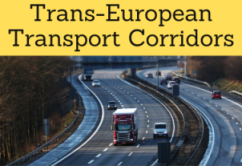
(c) EENI Global Business School (1995-2024)
We do not use cookies
Top of this page



